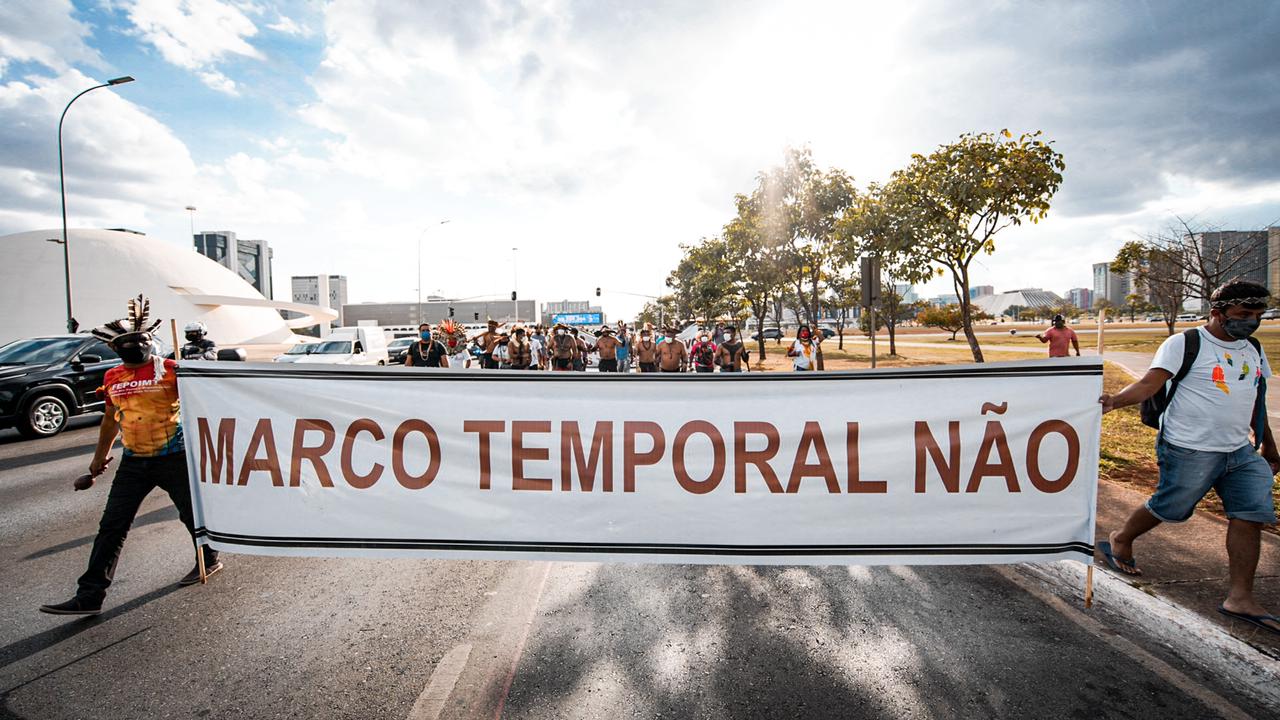Time frame: Moraes requests prioritisation and Supreme Federal Court interrupts ruling on demarcation of indigenous land
Case of general repercussion still has no date to return to the Court´s agenda. Indigenous people are mobilising against the proposition of a time frame
 Povos indígenas participam de manifestação em Brasília contra a tese do marco temporal. Foto: Eric Terena/Mídia Índia
Povos indígenas participam de manifestação em Brasília contra a tese do marco temporal. Foto: Eric Terena/Mídia Índia
The ruling of the general repercussion case concerning demarcation of indigenous land, that started at midnight on Friday (11) in a Supreme Federal Court (STF) virtual plenary session, was interrupted following a request for prioritisation made by Minister Alexandre de Moraes. The request came just a few minutes after the start of online voting.
The ruling had been set to take place from 11 to 18 June. Now, the president of the Supreme Court, Minister Luiz Fux will have to put the case back on the agenda. There is no definite deadline or estimated date for the matter to return to the Court´s voting agenda.
In theory, following the request for prioritisation, the ruling should be taken up again face-to-face. Due to the pandemic it had been held by video-conference. In other words, votes and oral statements on the ruling will be read and presented in real time and no longer in a virtual plenary session, in which written votes are put into the system by ministers.
The case concerns an action for repossession, issued by the Santa Catarina government against the Xokleng people, regarding Indigenous Land Ibirama-Laklãnõ, where the Guarani and Kaingang indigenous people live.
The status of ´general repercussion´ given by the STF to the case means that the decision taken will serve as a guideline for the federal government and the whole legal system regarding the demarcation of indigenous land. It will also underpin legislative proposals concerning indigenous land rights.
In this case, STF ministers will analyse the application of a ´time frame´. This interpretation is defended by the agribusiness community and sectors that have an interest in exploiting indigenous land. It restricts the constitutional rights of the indigenous people as it holds that these communities would only have the right to land if it was in their possession on 5 October 1988, the date of the signing of the Constitution.
Mobilisation
Since the beginning of this week, indigenous people have been protesting in Brasília and in territories around the country, in support of the STF and against the proposal of a ´time frame´. Mobilisation is still going on, in the hope that the case will be put back on the agenda and that the STF will reaffirm indigenous constitutional rights and fend off any likelihood of restricting or reversing that which is guaranteed by the 1988 Federal Constitution.
Furthermore, the indigenous people are alert and poised to stop attacks on their constitutional rights, such as bill of law 490, which could be voted on by the Constitution and Justice Committee (CCJ) in the Chamber of Deputies, any time now. In practice, the proposal makes demarcation of indigenous lands impossible and exposes them to predatory economic exploitation.
Indigenous people have also been monitoring the ruling on security measures for the Yanomami (Roraima) and Munduruku (Para) from 11 to 18 June and the request for a plan to remove miners and invaders from these lands and a further five territories, to be put into effect by the federal government. The requests were made by Articulação dos Povos Indígenas do Brasil (Apib), and other organisations, under the claim for non-compliance with a fundamental precept (ADPF) 709/2020.
At least 70 indigenous people from the south and south-east are camped out in Brasília, where they are following STF and National Congress activities.


